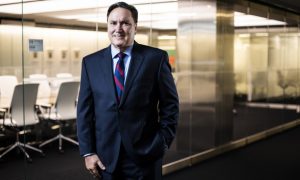Is UnitedLex the Future? Dan Reed Thinks So.
The alternative legal service provider's CEO has a vision that could forever alter the legal industry. Can he win enough converts to upend the legal job market? Or will UnitedLex turn out to be just another part of the fossil record?
January 01, 2019 at 05:40 PM
21 minute read
 Dan Reed, CEO of UnitedLex. Photo: David Handschuh/ALM
Dan Reed, CEO of UnitedLex. Photo: David Handschuh/ALM
When I flew from Chicago to New York City in early October to spend time with Dan Reed, the CEO of UnitedLex, I figured I would be telling a cabbie to take me to the Financial District. That's where the company's New York office is, on Broadway, just a short walk from the New York Stock Exchange.
But the night before our meeting, Reed sent me an email with a subject line that changed my plans: “Let's start at 10:30 a.m. Wednesday. We are at Latham's offices.”
So I found myself on a conference room floor at Latham & Watkins' Midtown offices, trying to work an espresso machine with the help of a receptionist—the lone Latham employee who appeared to know I was there.
Reed was there with at least one other UnitedLex executive—Nancy Jessen, a longtime Huron Consulting executive who now runs the part of UnitedLex's business that is seeking to transform corporate legal departments through a blend of outsourcing, technology and process improvement. She was a leader on a deal with DXC Technology that, prior to the mystery of Reed's presence at Latham that morning, I had been most eager to discuss.
The DXC deal was novel in an industry hungry for clues about its own transformation. No other legal department had “rebadged” 150 lawyers to a third party in the way DXC did with UnitedLex. No other legal department had told the public it cut its legal spending by 30 percent. No other legal department was planning, with the help of UnitedLex, to roll out a kind of TaskRabbit model (think: gig economy) whereby lawyers, as independent contractors, would negotiate the company's contracts on an ad hoc basis—from their homes, or the nearest coffee shop.
Today, 14 percent of America's law school graduates get hired by law firms with more than 100 lawyers. They are the lone cohort of graduates that, over the last eight years, has reliably earned six-figure median salaries, according to the National Association of Law Placement—testimony to the grip the nation's largest firms have had on corporate America's legal dollars. If UnitedLex's model takes off, what happens to that percentage—and to the law schools, lawyers, law firms and corporate legal departments designed around current expectations? When corporate legal work gets handled in bits by a larger swathe of the legal workforce, who wins and who loses?
To answer those questions, I wanted to know more about Reed, the man who has been selling this idea. A CPA turned Greenberg Traurig lawyer turned CFO turned CEO, Reed co-founded UnitedLex 12 years ago. It's taken him until now to develop a track record to support his oft-repeated claim that there is no other company impacting the business of law at the scale of UnitedLex.
The company says it inked deals worth an eventual $1.5 billion in revenue in a recent 18-month period. That was part of Reed's pitch to a prominent private equity backer, CVC Capital, that in October purchased a majority stake in his company. The purchase was reportedly worth $500 million.
CVC's investment positions UnitedLex to meaningfully expand. What was happening at Latham's office in early October seemed to be a part of that effort, even if neither Latham nor UnitedLex were willing to discuss it. Jessen came in and out of my conversation with Reed. She appeared to be shepherding some kind of negotiation involving Latham employees.
 Nancy Jessen, senior vice president of legal business solutions at UnitedLex.
Nancy Jessen, senior vice president of legal business solutions at UnitedLex.Reed didn't clarify why we were meeting in the offices of one of the country's biggest, most prestigious law firms, only saying that Latham was a “strategic partner.” A Latham spokesman said he had no information to share.
The episode seemed to encapsulate perhaps the biggest question facing UnitedLex, or anybody trying to dramatically change the way legal work is handled: When will the conversation turn from the future to the present? But it also hinted at an answer. UnitedLex is making serious progress, and in places many might not expect. And that progress, down the line, is likely to have major implications for the legal job market. Change is coming, and the Latham meeting is just one indication.
Riding the Tiger
To celebrate UnitedLex's 10th anniversary in 2016, Reed, an avid rock climber, had a crew film him scaling Linville Peak in North Carolina, a three-hour drive west of his home in Chapel Hill. Drones captured footage of a blue speck ascending the mountainside. Climbers with cameras followed Reed to the top of the peak, where he gave a speech intended to motivate the company's employees.
“Opportunity is all around us,” he said, unbuckling his climbing helmet. “To access it, you need only grasp it.”
Reed is prone to corporate-speak, but one line in the video offers a genuine glimpse at his approach. “Fear and doubt are not part of our corporate vocabulary,” he said. He is relentlessly optimistic in his quest to transform the legal market. How else could someone spend 12 years pushing a boulder up a hill?
UnitedLex got its start in a 10-by-10 office space in Gurgaon, India, soon joined by an office in Kansas City, Kansas. The company has been working ever since to shed a three-letter acronym attached to any legal company founded in India: LPO, as in legal process outsourcer. The term has become a sort of derogatory shorthand to describe staffing companies whose mission largely involves offshoring legal work to save labor costs. In an effort to confront the LPO stigma, UnitedLex has developed its own term to describe what it does: enterprise legal services.
Reed defines the company in three parts. First is an Accenture-like consulting division aimed at optimizing legal processes for law departments or law firms. The second is a technology division, which pairs UnitedLex-created software with expertise about what's available in the market. The final piece is the lawyers who can actually do the legal work. A large portion of UnitedLex's work is in document review or e-discovery projects, which it staffs out of offices in lower-cost cities like Columbus, Ohio; Gainesville, Florida; or Austin, Texas.
UnitedLex says it employs some 2,700 lawyers, engineers and consultants, with 65 percent based in the United States. In the last five years alone, the company has opened in Beijing, Singapore, Frankfurt, Stockholm, Copenhagen, Madrid and Toronto. It also has a captive law firm, Marshall Denning, that staffs about 60 lawyers and project managers.
Reed says UnitedLex was never intended merely to offer a labor arbitrage solution. It was born out of a project designed to optimize IBM's patent application processes and commercial transaction work. The idea was to combine the roles of a business consultancy and a law firm—a match for Reed's background at Greenberg Traurig and Capgemini, a French professional services and business consultancy firm. Reed worked as a corporate associate for five years at Greenberg Traurig before joining the consulting world as chief financial officer and general counsel of Adjoined Consulting, which was purchased in 2006 by Kanbay International, then acquired the next year by Capgemini, where Reed was managing director.
Luck played a role, too, in the creation of UnitedLex. Reed was introduced to IBM through a mutual client of Capgemini: the New York City Police Department. He thought he could apply his consultant experience to corporate legal spending, which hadn't been scrutinized in the ways IT, HR or accounting services had been.
“I thought, naively, that I'm going to take all of this I've learned from the technology world and I'm going to bring it to law and they're going to embrace it and it's going to be [great],” Reed says. “It didn't work out. So we had to wait. I thought we were going to be where we are now maybe seven or eight years ago.”
Reed was also drawn to the challenge UnitedLex presented. He had grown disenchanted with a career that seemed more about chasing personal wealth than anything else. He'd successfully exited two companies, first helping SmartDisk Corp. (which he joined after his stint at Greenberg Traurig) go public as its chief financial officer, then splitting from Adjoined when it was sold for $240 million in 2006. The money wasn't as satisfying as he'd expected. He grew tired of chasing the next big deal. UnitedLex offered something different.
“I didn't want to keep riding that tiger,” Reed says. “I wanted to trade accumulation for meaning.”
But how do you find meaning in optimizing corporate legal work? Reed says it often comes from helping the careers of the people who work at UnitedLex. His vision is broader than that, though. He wants to make the legal profession more satisfying by creating a market with more equitable opportunities for law school graduates. He describes it as “democratization”—a term often associated with what Uber did to the taxi market.
“If you don't open things up and empower different groups and all different constituents, you're not going to do something that's game-changing,” Reed says. “I'm not an artist. I'm not a technologist. But I do know the legal industry, so that is where I can make my difference.”
A Matter of Perspective
Of course, democratization can have its drawbacks. If you ever take a taxi again, just ask your driver what they think of Uber. If that much change comes to legal, there will be similar battle lines.
“In-house, we always thought those players [like UnitedLex] are going to kill law firms,” one top member of a major legal department says. “But the DXC deal shows they could get any of us. Lawyers in the next five years will be more like a gig economy. It's going to hit the legal profession, too.”
“The DXC Deal.” It was a headline among in-house lawyers, even if it was for a reason Reed wouldn't focus on: rebadging. It is a typically benign corporate term to define something that can feel personally disruptive for an employee: suddenly having a new employer. As a result of the deal, 150 DXC lawyers and professional staff became UnitedLex employees.
A rebadge doesn't come with a drastic pay cut; it's not the main source of savings for outsourcing deals. That comes, in part, from a new division of labor and technology-enabled processes that are meant to speed up certain tasks. At DXC, for instance, major contracts are less likely to be assigned in their entirety to the most experienced lawyer. Using a UnitedLex contract management technology called Contract Room, tasks are now more likely to be handled in stages based on complexity. A less experienced lawyer will handle the basic parts of even the biggest contracts. Experienced lawyers will handle the difficult aspects of the negotiations. It is the start of a model that disaggregates legal work.
 Bill Deckelman, executive vice president, general counsel and secretary of DXC Technology. Photo: Diego M. Radzinschi/ALM
Bill Deckelman, executive vice president, general counsel and secretary of DXC Technology. Photo: Diego M. Radzinschi/ALM“If you're a highly experienced lawyer—and this is true in law firms the same way—you better be focused on where your value is on the most complex pieces of the deal and not the whole deal,” DXC general counsel Bill Deckelman says. “Because with collaboration technology the way it is, we can break it up. I can have a kid sitting in Starbucks doing half of that deal while you focus on the complex aspects of several deals. What does that do? It lowers my cost. It's more efficient. And it gives the younger kids coming up a lot of responsibility.”
Still, the idea of rebadging can engender fear and doubt in lawyers. One former UnitedLex executive, speaking on the condition of anonymity to discuss a former employer, says companies would often call UnitedLex, seemingly interested in replicating the DXC deal or the deal UnitedLex announced with General Electric in March 2018, when it said it would cut the company's costs related to litigation services such as document review and e-discovery by 30 percent. But the real driver of in-house interest was self-preservation.
“Companies would come to us saying, 'Wow, I saw what you did with DXC, with GE, we need to talk. What's going on?' And you get excited thinking it's an opportunity, when, in fact, it's just people who are afraid you're coming to take their jobs,” the former executive says. “Instead of being seen as an incredible opportunity, we can be seen as a threat.”
Another Deal Closes
A month after our meeting in New York, Reed emailed to tell me about a “significant development at UnitedLex.”
Ford Motor Co. had agreed to a deal with UnitedLex to create an “IP incubator” that is designed to find ways for the car company's IP processes to be more efficient, to incorporate risk management and to look for ways to monetize the company's intellectual assets.
While the details of the engagement were still being finalized as this story went to press, the deal was, for Reed, a sign that UnitedLex was making progress on at least two fronts. It was winning contracts in a number of its business lines—e-discovery and litigation support, commercial contracting, intellectual property, and legal business solutions. That will go a long way toward securing more deals of the kind it ultimately wants: providing legal services to large companies across the entire enterprise. At the same time, the company was being trusted with increasingly important, sophisticated work.
“I don't think it's possible to overstate the significance of this,” Reed says. “It's not only the scale, but the sheer complexity and strategic nature of the work. This is rocket-science work in terms of what our engineering team, our lawyers will be doing.”
It also helped answer the question of just how many deals UnitedLex could secure, and what kind. It signified a type of general counsel that would see UnitedLex as a potential partner. Reed says the deal came about due to Ford General Counsel Bradley Gayton's “keen focus on Ford's role as a leader in mobility and technology innovation.”
Ultimately, the deal was intended to turn Ford's IP department into a revenue generating part of the business. It's a way for a general counsel to affect a legal department's bottom line.
DXC, created in 2017 by the merger of HP's Enterprise division and Computer Sciences Corp., has gone through its own convulsions. At least eight of the company's top executives were removed in January, according to IT trade publication The Register. Deckelman survived. The upheaval comes as the company's IT outsourcing business is being threatened by the rise of cloud-computing services, with which it is now starting to compete through a partnership with Amazon Web Services. Its share price had dropped 36 percent from a mid-September high by mid-November.
DXC and Ford are extreme examples of what most commenters believe is driving post-recession change in the legal industry: Corporate leaders are no longer willing to accept unchecked increases in legal costs. A UnitedLex contract is, at the moment, among the best ways to lock in those costs.
Reed says the targets of his company's sales pitches are often CEOs putting pressure on their legal departments to cut costs. In that environment, he says, there is more risk in inaction than in engaging UnitedLex.
“There are other people that can deal with GCs that are afraid. We're not here to do that,” Reed says. “And those general counsel that don't think like Bill [Deckelman] may not be general counsel very long. Because you're not thinking like the CEO. The CEO doesn't worry about a five-person NDA team. The CEO and CFO are worried about, 'You're costing me $20 million a year, $50 million a year. And you're worried about a team that costs $150,000? You're fired.' And that's often when we come in.”
A Post-Risk Environment
CVC's investment thesis in UnitedLex took into consideration the fear general counsel and lawyers would have of a relatively unproven outsourcing model. Siddharth Patel, a senior managing director at CVC who led the firm's investment in UnitedLex, says he was encouraged by the DXC deal because it gave Reed a successful story to tell to more risk-averse general counsel.
Patel says the company was appealing for other reasons, too. Its growth rate typically doubled or tripled the 8 to 10 percent annual average in the litigation services industry. It had a clear vision of dismantling entire sections of legal work within large corporations to drive efficiency and cost savings. And it had a passionate founder. Reed held onto his equity stake in UnitedLex through the sale of the company's prior private equity backers to CVC.
“Not only is he reinvesting all of his money, but importantly, Dan is a guy who is working 24/7,” Patel says. “He is truly committed to this. He travels around the world, wherever the clients need him. He has that sort of do-what-it-takes attitude and wants this to succeed. That's something we really bought into.”
“The art of the possible” is a corporate tagline members of the company's leadership team, including Reed, often discuss. It roughly translates to something like: How far can we go? It is a term that may have originated, at least at UnitedLex, from Eric Gonzales, who joined nearly six years ago from business process outsourcing company Williams Lea Tag.
“The art of the possible. That was always the BPO-speak for working consultatively with clients, and asking, 'Why just outsource IT? Why just [finance and accounting]? Can we outsource claims management? Can we outsource onboarding? Can we talk about the art of the possible?'” Gonzales says.
The DXC deal represents one story of what's possible, even if it is not an industry transformation. Chief legal officers surveyed by Altman Weil this year said they spent a mere 6 percent of their budgets on non-firm vendors such as UnitedLex. While Reed's optimism in UnitedLex is a trait you would expect in a leader, it can seem a hard contrast against a backdrop of slow industrywide progress. His full-throated belief in his own company has also bled over into criticism of other companies and individuals in an industry usually known for its collegial relationships. He often derides other litigation services companies as “staffing agencies,” or as “parasitic.” He has said that professors like Indiana University Maurer School of Law's Bill Henderson “pontificate” while having “very little impact.”
For his part, Henderson once built Lawyer Metrics, a company that used data to help law firms hire lawyers. Henderson's business was met with a skeptical target market, and he has been studying the diffusion of new ideas in the business world ever since. He says the biggest challenge facing UnitedLex is similar to the one he confronted: General counsel at America's largest corporations know the type of lawyer they want to handle their legal work.
“There is a frame that has been built regarding if you're smart enough to do corporate legal work. And it has to do with going to a good school and going to a good law firm,” Henderson says, adding that general counsel “are not stupid. They are just stuck in that frame.”
That cultural issue may not exist in some corporate departments or among individual general counsel, but more broadly, it may take a generation to solve, Henderson says.
“He is building a really good company, but I don't think that any of these LPOs will ever have their hockey stick moment” Henderson says of Reed and UnitedLex. “I think my best analysis on UnitedLex is the same on LPOs: It's just a long slog.”
The Future of Work
UnitedLex's work with DXC and others has represented the culmination of ideas Jessen believed in for years as a legal department consultant—particularly that by better aligning talent and task, legal departments can reduce costs. As legal departments in-sourced lawyers from law firms over the past decade or more, she says, they have adopted the inefficiencies that existed within the law firms they sought to replace. If there has been a massive labor arbitrage play in legal, it has been the growth of in-house departments.
As of 2016, roughly 22 percent of lawyers in private practice were working in-house, compared with less than 15 percent of lawyers who were working in the Am Law 100. That is a remarkable adjustment from just nine years earlier, when the proportions were roughly equal at 18 percent.
“For years I have been demonstrating for law departments that the seniority of their team far outweighs the complexity and risk of their work,” Jessen says. “But they keep saying we want to do talent development and help them rise within the company. That's all great. But if you keep giving promotions and either people keep doing the same work because it's comfortable or really there was not that much work at that high level, then you get turned upside-down in-house.”
To get to a more efficient division of labor, Jessen says, “a lot of legal roles simply need to be jobs.”
Reed is unusually cagey when talking about Deckelman and DXC's plans to use a gig economy model to handle aspects of contract negotiations. Handing law school graduates a computer and a playbook for negotiations and sending them on their way can be a risky proposition, he admits.
“That can work only if you have a very robust training platform,” he says. “You have to have some sort of uniformity, consistency and depth. Otherwise, it could be chaos. I believe in Bill's vision on that. I 100 percent endorse that. But you have to have a strong training program around that, and we are capable of doing that.”
UnitedLex's long-running partnerships with law schools aren't often discussed, but they are undoubtedly key to the company's longer-term goal of reorganizing legal talent to legal jobs.
The company has created joint ventures with nearly 10 law schools, including Ohio State University and Vanderbilt University (Reed's alma mater), that provide both practical training and employment for law school graduates. Reed likens the idea to residency programs for medical doctors. The recent graduates handle real work from corporations, and the profit from that work is split between UnitedLex and the law schools whose alumni refer the company that work. The programs are part of an effort to provide more skills-based and technology training to law school students and recent graduates than schools offer today. It offers training for a future legal market that is less reliant on pedigree and more reliant upon skills and performance.
The program has at least a couple of purposes. One is as a recruiting channel for UnitedLex itself. Another is a sort of marketing play. Vanderbilt alumni will see the work UnitedLex does and bring that knowledge to their employers.
“What we're doing is accelerating evolution,” Reed says.
In the course of my reporting, I asked people the same question: Do you think that in the coming years a larger or smaller proportion of law students will end up at Big Law firms? Most said smaller. One law firm executive said he could see a day where Big Law firms no longer hire first-year associates from law schools. Instead, they would hire third- or fourth-year lawyers with demonstrable skills.
“There is enough financial incentive to not have new lawyers,” the executive said.
“Do I think the students of today will have to prepare for this? Absolutely,” a top corporate legal department executive said.
Maybe someday those UnitedLex trainees might find themselves roaming the hallways of the nation's most prestigious law firms—Latham & Watkins, for instance. If that happens, it will mean UnitedLex has convinced enough people that it's not a risk or a threat. Instead, they'll see, it's a missing piece in the legal market puzzle. That's Dan Reed's vision, anyway.
Email: [email protected]
Correction: An earlier version of this article misstated Duke University as having a joint venture with UnitedLex.
This content has been archived. It is available through our partners, LexisNexis® and Bloomberg Law.
To view this content, please continue to their sites.
Not a Lexis Subscriber?
Subscribe Now
Not a Bloomberg Law Subscriber?
Subscribe Now
NOT FOR REPRINT
© 2025 ALM Global, LLC, All Rights Reserved. Request academic re-use from www.copyright.com. All other uses, submit a request to [email protected]. For more information visit Asset & Logo Licensing.
You Might Like
View All
Alston & Bird Adds M&A, Private Equity Team From McDermott in New York
4 minute read
Veteran Federal Trade Law Enforcer Joins King & Spalding in Washington
4 minute read
Houston Trial Lawyer Mary-Olga Lovett Leaves King & Spalding to Open Boutique
3 minute readTrending Stories
- 1Family Court 2024 Roundup: Part I
- 2In-House Lawyers Are Focused on Employment and Cybersecurity Disputes, But Looking Out for Conflict Over AI
- 3A Simple 'Trial Lawyer' Goes to the Supreme Court
- 4Clifford Chance Adds Skadden Rainmaker in London
- 5Latham, Kirkland and Paul Weiss Climb UK M&A Rankings
Who Got The Work
J. Brugh Lower of Gibbons has entered an appearance for industrial equipment supplier Devco Corporation in a pending trademark infringement lawsuit. The suit, accusing the defendant of selling knock-off Graco products, was filed Dec. 18 in New Jersey District Court by Rivkin Radler on behalf of Graco Inc. and Graco Minnesota. The case, assigned to U.S. District Judge Zahid N. Quraishi, is 3:24-cv-11294, Graco Inc. et al v. Devco Corporation.
Who Got The Work
Rebecca Maller-Stein and Kent A. Yalowitz of Arnold & Porter Kaye Scholer have entered their appearances for Hanaco Venture Capital and its executives, Lior Prosor and David Frankel, in a pending securities lawsuit. The action, filed on Dec. 24 in New York Southern District Court by Zell, Aron & Co. on behalf of Goldeneye Advisors, accuses the defendants of negligently and fraudulently managing the plaintiff's $1 million investment. The case, assigned to U.S. District Judge Vernon S. Broderick, is 1:24-cv-09918, Goldeneye Advisors, LLC v. Hanaco Venture Capital, Ltd. et al.
Who Got The Work
Attorneys from A&O Shearman has stepped in as defense counsel for Toronto-Dominion Bank and other defendants in a pending securities class action. The suit, filed Dec. 11 in New York Southern District Court by Bleichmar Fonti & Auld, accuses the defendants of concealing the bank's 'pervasive' deficiencies in regards to its compliance with the Bank Secrecy Act and the quality of its anti-money laundering controls. The case, assigned to U.S. District Judge Arun Subramanian, is 1:24-cv-09445, Gonzalez v. The Toronto-Dominion Bank et al.
Who Got The Work
Crown Castle International, a Pennsylvania company providing shared communications infrastructure, has turned to Luke D. Wolf of Gordon Rees Scully Mansukhani to fend off a pending breach-of-contract lawsuit. The court action, filed Nov. 25 in Michigan Eastern District Court by Hooper Hathaway PC on behalf of The Town Residences LLC, accuses Crown Castle of failing to transfer approximately $30,000 in utility payments from T-Mobile in breach of a roof-top lease and assignment agreement. The case, assigned to U.S. District Judge Susan K. Declercq, is 2:24-cv-13131, The Town Residences LLC v. T-Mobile US, Inc. et al.
Who Got The Work
Wilfred P. Coronato and Daniel M. Schwartz of McCarter & English have stepped in as defense counsel to Electrolux Home Products Inc. in a pending product liability lawsuit. The court action, filed Nov. 26 in New York Eastern District Court by Poulos Lopiccolo PC and Nagel Rice LLP on behalf of David Stern, alleges that the defendant's refrigerators’ drawers and shelving repeatedly break and fall apart within months after purchase. The case, assigned to U.S. District Judge Joan M. Azrack, is 2:24-cv-08204, Stern v. Electrolux Home Products, Inc.
Featured Firms
Law Offices of Gary Martin Hays & Associates, P.C.
(470) 294-1674
Law Offices of Mark E. Salomone
(857) 444-6468
Smith & Hassler
(713) 739-1250











